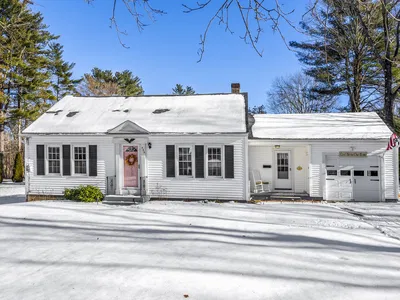
When I go to the grocery store these days, it’s not like it used to be. Not only are prices up, but things I intended to buy simply aren’t on the shelves. It’s like, what the heck happened to Cascadian Farm cereals? Jay likes the “Oats and Honey” cereal, and it’s been out of stock for nearly five months. It’s this company’s most popular cereal, and Cascadian Farm isn’t some tiny, hippie run organic company. It’s owned by General Mills.
The real estate market is similar. There’s not much on the market, and prices are up, and the reason is the same–supply chain problems plus inflation. Consider new home building–the builders’ costs are up thanks to cost of material inflation and supply chain issues. And buildable land is scarce, with no obvious way for it to be increased. They’re not making more land.
And how about those interest rates? In my opinion, it’s such a terrible way to fight inflation, because it dumps the pain right on to the middle class, especially those with credit card payments. On the other hand, if you’re well off, you can take advantage of those high rates by buying bonds or CDs, and if you were the government you could just deficit spend.
It’s like a ‘perfect storm’. So how to navigate through it? First, and I’m not just saying this because I am an experienced realtor, but you really need an experienced realtor, whether you are buying or selling. Gone, at least temporarily, are the days of just listing a house or putting in an offer, and everything is fine. These days, it’s often the little things that make the difference….what’s on your offer, how is your house staged, how are potential buyers reached, pricing, etc. It all has to be correct because the margin for error has shrunk.
As just an interesting aside, interest rates are obviously a huge factor in the housing market, but try living in New Zealand. Our daughter Jane, along with her husband and two children, bought a nice modest house at a good interest rate about four years ago. If they had bought here, they’d have locked in record low interest rates for the life of their mortgage, but it doesn’t work like that in New Zealand. There, you cannot lock in rates. Banks can redo the loans every two years or so, adjusting them to current rates. You can just imagine what this does to household budgets.
But we live here, so the advice really remains the same. Inflation is a fact of life, and you have to live somewhere, and we can renegotiate mortgage rates here, when we want to, not when the bank wants to. Rental rates are going up probably more than home prices, and renting is equivalent to a 100% interest rate–absolutely nothing goes to principal, so you are not building any equity. It’s more like buying food–you eat it and it’s gone (don’t take that analogy too far).
And if you are selling, and you have somewhere to go next, it’s still a good time to sell. There aren’t as many buyers now, thanks to interest rates, but there also are many fewer homes on the market, and in terms of what sale price you can get, it’s still supply and demand–the ratio of buyers to houses for sale is high, which is why home prices keep going up. For buyers, it’s still better than renting, you can always (assuming creditworthiness) refinance. And given the land scarcity in our area, home prices are unlikely to do anything but continue up.
I’m very much looking forward to the day when I’m writing about how liquid and healthy the real estate market is, but in the meantime, “it is what it is”. I’m having conversations with potential sellers daily, as many people need to move due to lifestyle issues and unexpected changes. The house pictured above was listed due to an unexpected seller circumstance, we found a very patient buyer, and even though it had snow on it for the listing photos, it sold last week, at the end of August. The real estate market is always happening in one way or another.



